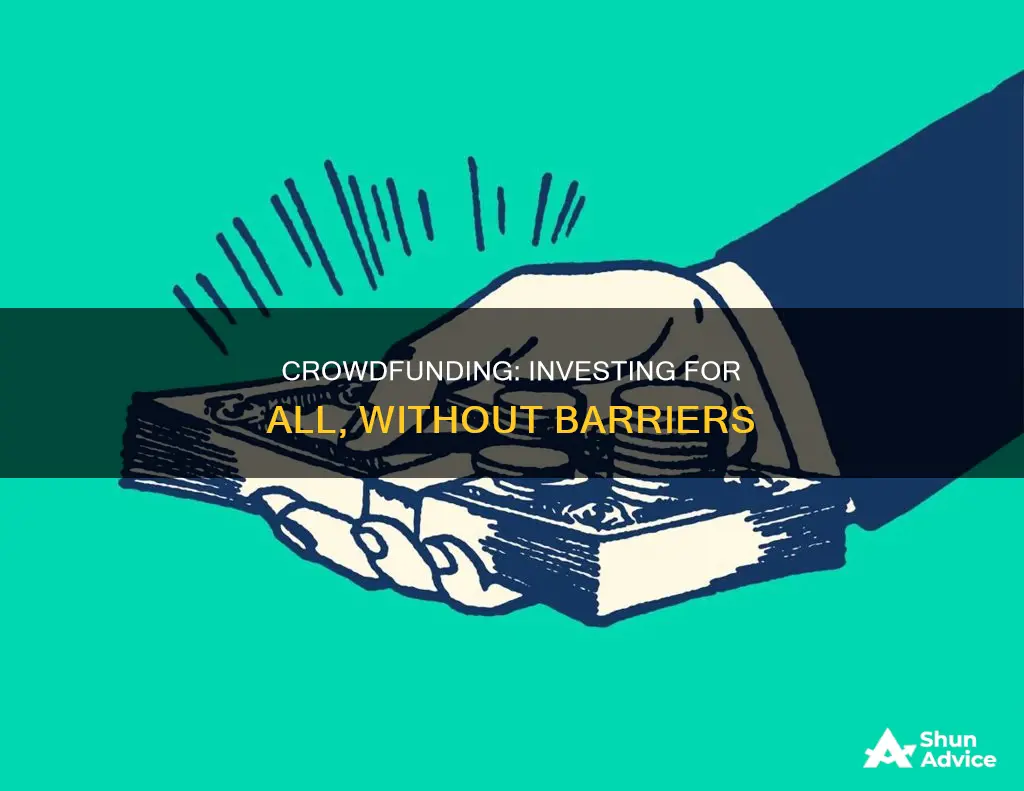
The Securities and Exchange Commission (SEC) classifies investors as accredited or non-accredited based on their net worth and income. Non-accredited investors are those who do not meet the SEC's income or net worth requirements. These investors are subject to different regulations and have access to different investment opportunities compared to accredited investors. While they may have more limited options, non-accredited investors still have various investment avenues available to them, including certain types of bonds, equities, and securities. One such option is crowdfunding, which has opened up new possibilities for non-accredited investors to participate in early-stage investing.
| Characteristics | Values |
|---|---|
| Income | Less than $200,000 annually ($300,000 with a spouse) |
| Net Worth | Less than $1 million excluding primary residence |
| Investment Options | Real estate, equity crowdfunding, peer-to-peer lending, certain types of bonds, equities, and other securities |
| Investment Restrictions | Hedge funds, private equity, and other high-risk investments |
| Documentation Requirements | More disclosure and documentation requirements for funds |
What You'll Learn

Equity crowdfunding
If a business wants to use equity crowdfunding to raise capital, following the rules is critical. Failure to do so might result in having to refund any investments received. In some cases, the U.S. Securities and Exchange Commission (SEC) may even freeze a business's ability to offer shares to investors for a period of time.
- Work with an SEC-registered broker-dealer (also known as a funding portal) to process any investment transactions.
- Accept no more than $5 million per year in crowdfunding investments.
- Follow federal limitations on the amount accepted from individual, non-accredited investors in a 12-month period (amounts vary based on income).
- Make any necessary financial disclosures public, based on the amount of funding raised.
Pros of Equity Crowdfunding
- It offers a business funding solution if sufficient financing cannot be obtained elsewhere due to credit issues, revenue limitations, or other lender requirements.
- There is no debt to repay.
- Working with a larger number of investors may result in raising more money.
- As a business owner, you can structure crowdfunding campaigns to retain the majority of your business equity and only offer a small portion to investors.
- You may be able to attract non-traditional investors to support your business goals.
- You can gain visibility and build excitement before launching your new business.
Cons of Equity Crowdfunding
- You give up a portion of your company's future profits in exchange for cash.
- Per SEC guidelines, you must disclose your company's financial details to potential investors, and this information becomes accessible to almost anyone.
- There is a risk of public failure if your equity crowdfunding campaign isn't successful.
- Equity crowdfunding platforms charge fees and may keep a percentage of the funds raised (often 5-15%) in the form of commission.
- Traditional investors may not be interested because it can be challenging to resell the shares of smaller companies without taking a financial loss.
- Crowdfunding campaigns can be time-consuming, and there is no guarantee of generating enough funding to make the time commitment worthwhile.
Key Factors for Investors to Consider in Mutual Funds
You may want to see also

Real estate crowdfunding
Here's how it works:
- Investment Opportunity: Real estate crowdfunding starts with a project or property that needs funding. This could be residential or commercial real estate, or even debt instruments like mortgage loans.
- Role of Crowdfunding Platforms: Online platforms act as intermediaries, connecting investors with real estate opportunities. They perform due diligence on the projects, list them for investors to consider, and manage the collection and distribution of funds.
- Types of Investments: There are two main types of real estate crowdfunding investments: equity and debt. In equity-based crowdfunding, investors buy shares in a real estate project and become partial owners. In debt-based crowdfunding, investors lend money to finance real estate projects and receive fixed interest payments.
- Investor Selection and Tracking: Investors can select projects to invest in through the platform, contribute their chosen amount, and then track the progress of the investment online.
The benefits of real estate crowdfunding include:
- Accessibility: Lower financial barriers allow a broader range of investors to participate, even those with limited funds.
- Diversification: Investors can diversify their portfolios by investing in various property types and locations, spreading their risk.
- High Returns: Equity investments can yield higher returns compared to some traditional investments, such as publicly traded REITs.
However, it's important to consider the risks and challenges, such as market volatility, regulatory considerations, and the importance of conducting thorough due diligence.
Private Equity Funds: Impact Investing Strategies Revealed
You may want to see also

Peer-to-peer lending
P2P lending offers several benefits. For borrowers, it provides an alternative to traditional banks or lower interest rates than they could get at one. For lenders, it offers the potential for a better return on their cash savings than they would earn with a bank account or money market fund. Additionally, P2P lending can be more accessible to borrowers, thanks to easy application processes and sometimes higher loan amounts.
However, there are also risks associated with P2P lending. Default rates for P2P loans can be much higher than those in traditional lending, and individuals who lend money through a P2P site need to consider the possibility of borrowers defaulting on their loans. P2P lending platforms also impose fees on borrowers or lenders, or sometimes both.
In terms of regulations, the Securities and Exchange Commission (SEC) assumes that all parties involved in private investments know the risks and rewards involved, so they have a lighter regulatory touch. However, these private funds must pay close attention to their compliance and ensure their investor counts stay within the rules, as they can lose their regulation status. For example, Regulation D keeps the number of non-accredited investors in a private placement below 35.
To sum up, while P2P lending offers advantages such as accessibility and potentially better rates for borrowers and lenders, it also comes with risks, including higher default rates and fees. It is essential for individuals to carefully consider these risks and regulations before participating in P2P lending as either a borrower or a lender.
Best S&P Index Funds: Top Picks for Your Portfolio
You may want to see also

Mutual funds
- Diversification: Mutual funds provide access to a diversified portfolio of securities, reducing risk for investors.
- Professional management: Mutual funds are managed by professional fund managers who oversee the portfolio and make investment decisions based on the fund's strategy.
- Liquidity: Mutual fund shares can be bought and sold relatively easily on major stock exchanges, providing liquidity to investors.
- Variety of offerings: Mutual funds offer a wide range of investment options, including stock, bond, money market, and target-date funds.
- Economies of scale: By pooling money from multiple investors, mutual funds can benefit from economies of scale, reducing transaction costs for individual investors.
However, there are also some drawbacks to investing in mutual funds, including:
- High fees: Mutual funds charge annual fees, expense ratios, or commissions, which can reduce overall investment returns.
- Lack of control: Investors have less control over the timing of recognition of gains and the predictability of income.
- Lack of customization: Mutual funds do not allow investors to customize their investments.
- Transparency: Mutual funds may not provide full transparency into their holdings, making it difficult for investors to compare different funds.
Overall, mutual funds are a popular investment option, particularly for retirement savings, and offer a balanced approach to investing by providing access to diversified portfolios and professional management.
Vanguard Windsor II: Uncovering its Security Strategy
You may want to see also

Real estate
REITs allow anyone to own or finance properties by purchasing stock. They are an appealing option as they typically offer stronger payouts than traditional stocks on the S&P 500. REITs provide high-yield dividends, portfolio diversification, and the opportunity to invest in properties without the challenges of direct ownership. However, it's important to consider the associated risks, such as sensitivity to interest rates and specific properties' risks.
Crowdfunding Platforms
Crowdfunding is a method of raising capital by soliciting contributions from the public. It offers non-accredited investors the ability to become shareholders in real estate ventures they wouldn't typically have access to. Crowdfunding provides portfolio diversification, a lower barrier to entry with minimum investments as low as $1,000, and the opportunity to invest in various ventures, including real estate, start-ups, and tech. However, it's important to carefully vet the companies and entrepreneurs seeking investment, as there is a higher risk of losing capital due to the infancy stage of projects and the lack of regulation in crowdfunding.
Joint Ventures and Partnerships
Joint ventures and partnerships provide opportunities for non-accredited investors to collaborate with others and pool their resources for real estate ventures. A joint venture is typically short-term and involves two or more entities working together on a specific project. On the other hand, a partnership is designed to last for the life of a business and usually involves individuals joining together. It's important to understand the differences in culpability between joint ventures and partnerships, as well as the scope and size of what can be achieved through these collaborations.
Alternative Investment Platforms
Alternative investment platforms, such as Concreit, DiversyFund, Fundrise, and Yieldstreet, offer non-accredited investors access to real estate investment opportunities. These platforms may provide options such as investing in rental homes, multifamily properties, commercial real estate, or various other asset classes. Some platforms have low minimum investment requirements, making it more accessible for those new to real estate investing. However, it's important to carefully review the fees, investment lengths, annual fees, and redemption policies associated with each platform.
Direct Ownership
Non-accredited investors can also consider direct ownership of real estate, such as investing in single-family rental properties, multifamily buildings, or short-term vacation rentals through platforms like Roofstock. This option provides the advantage of collecting rent immediately if the properties are already tenant-occupied. However, direct ownership of real estate is highly illiquid, and investors must have sufficient funds for potential repairs and expenses.
Best TSP Funds to Invest in Now
You may want to see also
Frequently asked questions
A non-accredited investor is an individual who does not meet the income or net worth requirements set out by the Securities and Exchange Commission (SEC). Non-accredited investors are also known as retail investors.
The difference is determined by the SEC, which classifies investors into these two types of buckets based on net worth and salary. Accredited investors have a net worth of more than $1 million and an income of over $200,000 annually (or $300,000 combined with a spouse). Non-accredited investors fall below these thresholds.
Non-accredited investors can invest in certain types of bonds, real estate, equities, and other securities. They can also participate in equity crowdfunding, real estate crowdfunding, and peer-to-peer lending.







